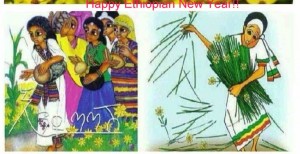Ethiopian Calendar
About the Ethiopian Calendar: Time, Dates and Years in Ethiopia
Inqutatash or Ethiopian New Year is celebrated on the 11th of September. But in a Leap Year this great holiday is celebrated on the 12th of September. Ethiopia follows the Orthodox Julian calendar which consists of 12 months of 30 days and a 13th month, Pagume, of five or six days, depending on whether or not it is a leap year. There is a seven years and eight months difference between the Ethiopian and the Gregorian calendar, so 11 September 2013 is 1 Meskerem 2006 in Ethiopia. This is because the Ethiopian Orthodox Church believes that Ethiopia has been counting the years starting right after the birth of Christ.
The way Ethiopians measure time is also different from the West. The clock starts at 6am western time and runs until 6pm. Therefore 8o’clock in western time would be 2o’clock Ethiopian time. Because Ethiopia is close to the Equator the sun rises at around 00:30 Ethiopian time and sets at around 12:45 in the evening (6:45 western equivalent) all year round. Ethiopia is 3 hours ahead of GMT (Greenwich Mean Time).
The years run in a four year cycle bearing the names of the four Saints with the year of John or Yohannes (Amharic) is being the leap year.
Meskerem : 11th September
Tikimt : 11th October
Hidar : 10th November
Tahsas : 10th December
Tir : 9th January
Yakatit : 8th February
Maggabit : 10th March
Miyazya : 9th April
Ginbot : 9th May
Sene : 8th June
Hamle : 8th July
Nehasa : 7th August
Pagume : 7th September
Inqutatash is an important festival in the lives of Ethiopians. After three months of heavy rains the sun shines fully, the sky will be clean, creating a beautiful environment with fresh air, all main and tributary rivers become cleaner from the heavy flooding and flow slower with a medium water level. The highland fields turn to gold and mountains and fields will be decorated by the colourful Maskal Flowers. When Makeda (the Queen of Sheba), returned to Ethiopia after her famous visit to King Solomon, her People welcomed her by giving her “Inqu” or jewels. Inqutatash which means “gift of jewels or Precious gems which includes Diamond and other more expensive precious gems as inqu (Amharic)”‘ has always been celebrated in spring. Meskerem is seen as a month of transition from the old year to the new. It is a time to express hopes and dreams for the future.
www.iwooket.com or email to admin@iwooket.com

Leave a Reply
You must be logged in to post a comment.